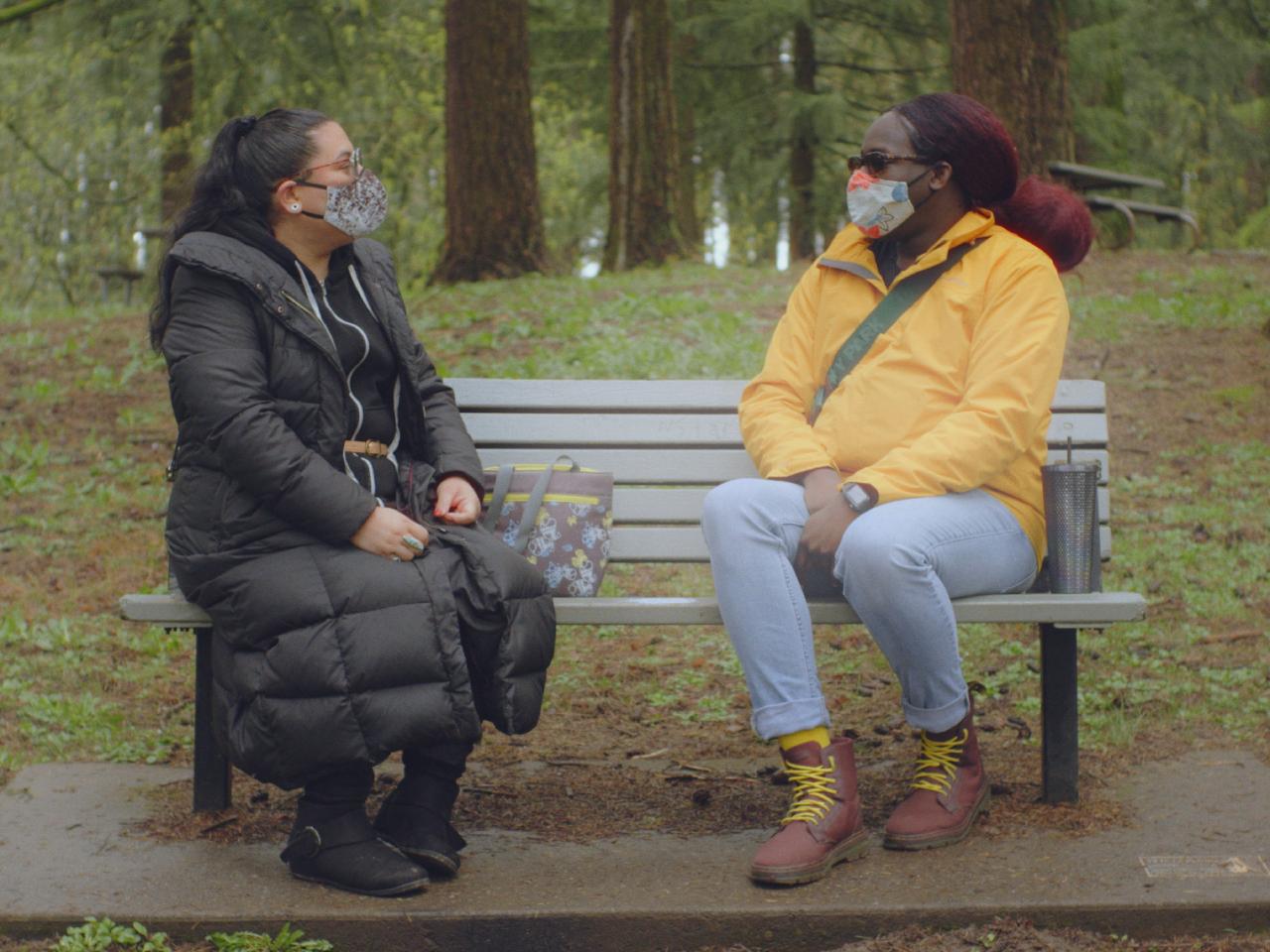New Releases from New Day Films - Fall, 2025

In our seasonal “New Releases” write-up, we look for common threads and themes among the inevitably disparate subjects and subject matter explored by a diverse group of artists/filmmakers. This fall’s group of new releases focus on how the film’s main characters confront some variation of feeling like (or being seen as) “the other.” And then, as The Bard might write, these protagonists “take arms against a sea of troubles, and by opposing end them,” through struggle, fighting back, forming alliances and relying on inner strength. “The other” might be working class among the wealthy elite; indigenous ruled by an oppressive government; “outsider” artist using found articles and crossing cultures; Jews faced with the dark cloud of Nazism; athletes beset by judgment (their own and from peers) about body-weight, Chinese negotiating life in the Deep South; trans people isolated during the Covid pandemic. In each of our new-release films, the filmmakers have found their own creative ways to dig deep, uncovering and portraying setbacks, triumphs, grit, humor and resilience, in ways both provocative and uplifting. And like all the titles in the New Day Films catalog, our new additions illuminate, inspire and challenge.
We invite you to watch trailers and learn more about these films:
The Highest Standard
by Isara Krieger, 90 min.
Beacon Academy in Boston, MA offers a unique opportunity for a handful of public school students each year who would not otherwise have access to the private boarding high schools that are entry vehicles to the world-class universities that populate the region. This gap year after 8th grade prepares primarily students of color and/or from low income families to be able to exit the under-funded public school system for greater opportunity. Higher Standard follows three students through this journey– revealing successes, stumbles and contradictions. The film ultimately poses the question: Are these students being challenged to discover their true nature, or are they being molded into someone else's vision of success?
Watch the trailer:
Karuara, People of the River
By Stephanie Boyd, 77 min., 56 min.
While foreign companies earn millions from the Amazon’s resources, Indigenous communities lack potable water, health care and schools. In this film, Mari Luz leads an organization of Kukama women who file a ground breaking lawsuit demanding the Peruvian government recognize their river as a legal person. Karuara, which means “people of the river,” has won 12 awards worldwide, and Mari Luz was awarded the prestigious Goldman Environmental Prize for Latin America (known as the Green Nobel) for her efforts.
Watch the trailer:
Call Me Waya
by Charles Abelmann, 39 min.
Wayacón is an octogenarian Cuban, a self taught “outsider” artist producing fantastical, childlike work that often incorporates found materials: cardboard scraps, shirts, a doctor’s jacket, shoes, hats, pants, sticks, stumps and wood. Call Me Waya follows the artist’s tumultuous life trajectory, including his struggle with substance abuse. He is visited by Sandra Levinson from the United States, a Cuban art expert and director of the Center for Cuban Studies. Striking a close bond, the two take us on a rich journey of inter-cultural exchange between two people as they overcome 60-year Cold War prohibitions, exposing hundreds of Americans to Cuban art and culture.
Watch the trailer:
Shifting Paths
by Charles Abelmann, 42 min.
Arthur Abelmann founded the pharmaceutical company Chemiewerk in Frankfurt in the early 1920s, employing over 100 people and known for chamomile-based remedies. With Hitler’s rise to power, the Nazi Doctors' Association banned his products, and on the eve of Boycott Saturday in 1933, he sent his family to Zurich before resigning from Chemiewerk. This multi-generational family history unfolds through first-person narratives voiced by Arthur Abelmann’s grandson, filmmaker Charles Abelmann, and Charles’ own son. Family photographs, letters, artifacts, and a healing medicine that survived through the ages, to reveal a story about the vibrant cultural Jewish life in Frankfurt, and its rapid demise on the eve of the Holocaust.
Watch the trailer:
Why Don't You Lose 5 Pounds?
By Chris Blunk, 55 min.
Welcome to the Victory Program, the nation's most intense eating disorder treatment program exclusively for athletes. Why Don’t You Lose 5 Pounds? is a different kind of sports movie. It immerses viewers in the intimate, often invisible battles athletes face with eating disorders. Like any great sports story, it’s about striving, setbacks, and resilience.Through the wins and losses of athletes in Victory, we learn how the fierce drive of these elite athletes contributes to a dangerous mental illness - and may be their key to recovery.
Watch the trailer:
Bluff City Chinese
by Thandi Cai, 46 min.
Bluff City Chinese follows two Chinese-American storytellers, filmmaker Thandi Cai and elder historian Emerald Dunn, as they uncover the untold history of Chinese immigrants in Memphis, Tennessee. Through personal journeys, community oral histories, and archival research, the film weaves a 150-year tapestry of identity, belonging, and resilience. Set against a backdrop of social and racial tensions, this intergenerational collaboration celebrates the power of storytelling to preserve heritage, bridge divides, and inspire unity for future generations.
Watch the trailer:
Connection | Isolation
by G. Chesler, 85 min., 67 min., 7-part series
During a pandemic when separation, isolation, and self-sufficiency became the norm, many trans people faced the COVID-19 era differently. Connection | Isolation presents eight portraits of trans and post-gender people who cultivate community in this pandemic. These trans participants foreground how trans people are disproportionally impacted by Long COVID, how Asian Americans faced violent racism during the pandemic, how Black Americans and allies rose in opposition to police-state violence in 2020, and how disabled people felt excluded from a society that—despite grave and massive loss—refused basic protections. The film also highlights how the pandemic gave some trans people more space to explore and understand their identities, community, and bodies.